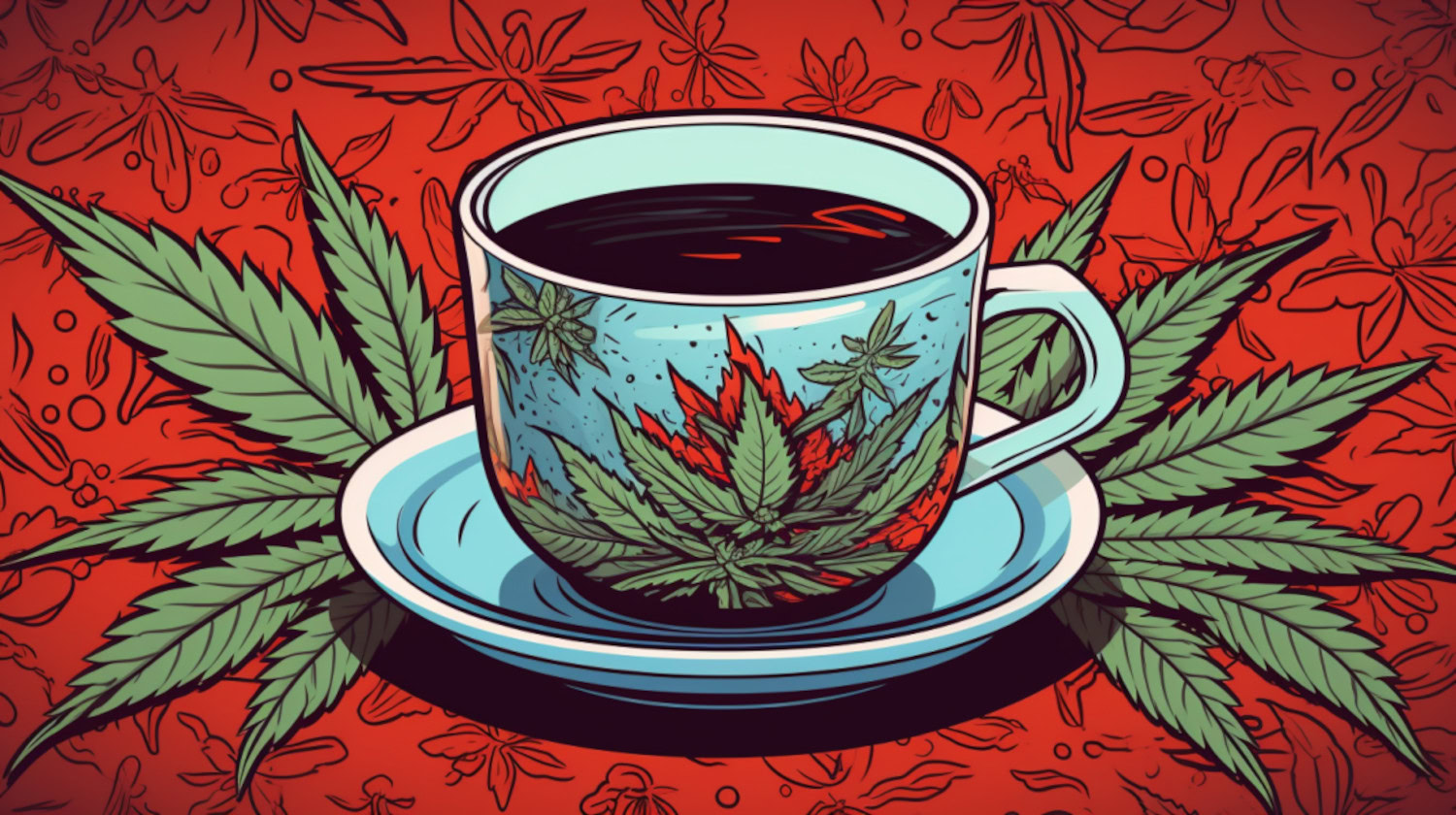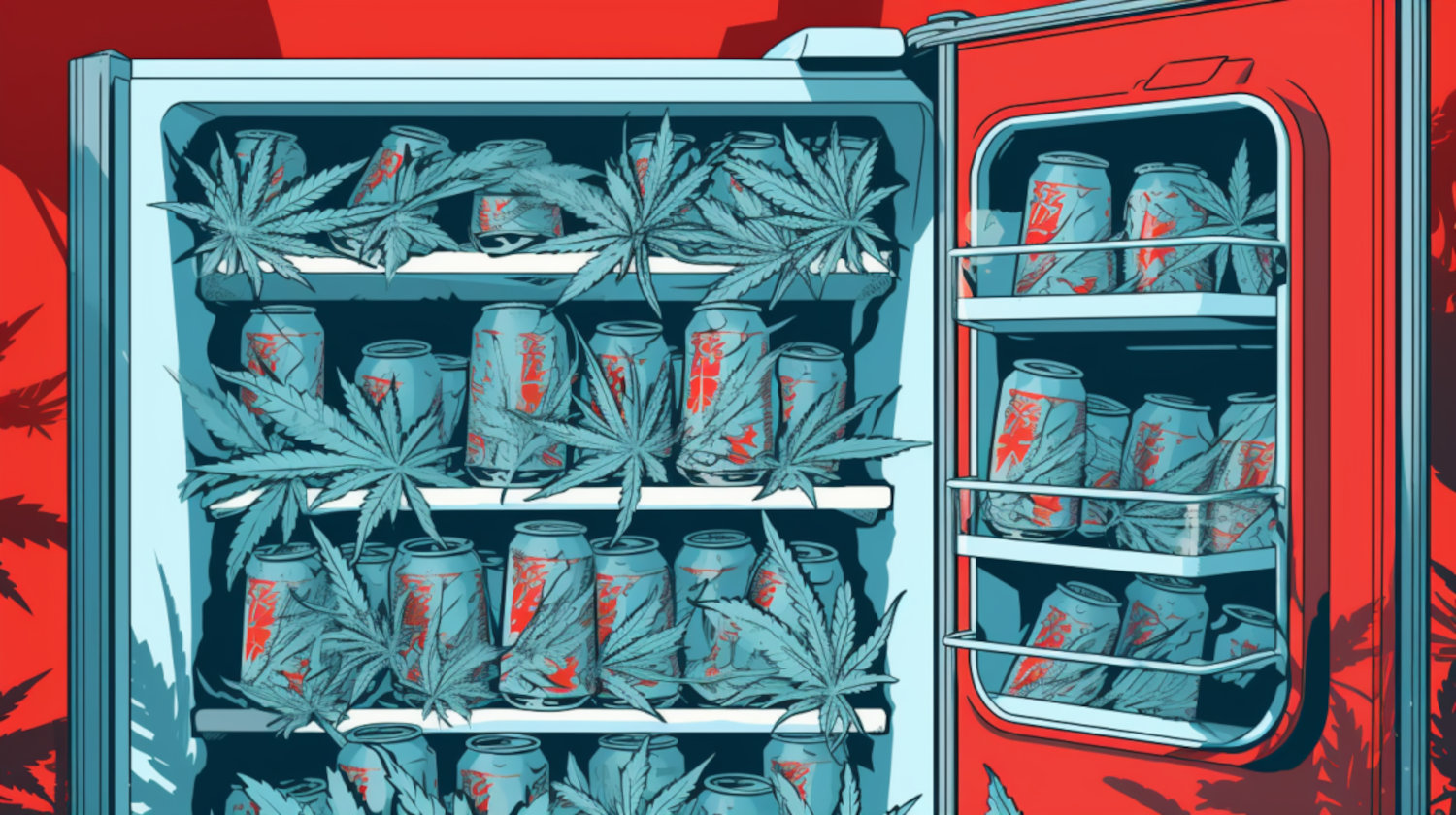In This Article
- What is THC Coffee?
- What is CBD Coffee?
- How is THC Coffee Made?
- Advantages of THC Coffee
- Drawbacks of THC Coffee
- How to Make THC Coffee
- Supplies Needed for All Methods:
- Method One: Dispensary Purchased Add-ins
- Method Two: Cannabis Butter (Cannabutter) or Cannabis Oil
- General Tips When Making THC Coffee
- Tips for Buying THC Coffee
- Top THC Coffees
- Kush Coffee
- Sträva Craft Coffee – Dark Roast CBD Coffee
- DIY: How to Infuse Coffee Beans with CBD or THC
- References
Coffee is one of the world's favorite stimulants, from hot or iced to black or lightened with cream. The caffeine can give you a perceived energy boost, but cannabis-infused coffee may provide you with a different morning experience. THC coffee is a popular trend for regular cannabis consumers as well as those looking for new ways to enhance their morning cup of coffee.
What is THC Coffee?
THC coffee is your standard cup of joe with a cannabis infusion. There are many different ways to make it at home, but consumers have found a variety of ways to enjoy coffee and weed.
Consumers can opt for making cannabis-infused coffee at home by infusing beans or creating upgrades, like creamers and sugar. It doesn’t have to be a complicated process; users can add tincture to their morning brew by stirring it directly in the cup.
There is also the option of store-bought THC-infused beans, ground coffee, or K-cups. Like regular coffee, THC coffee is versatile, with different roasts for individual tastes and preferences.
The allure of THC coffee lies in its multi-action effect. It may offer improved focus, anxiety relief, pain relief, and enhanced mood. The caffeine in the coffee energizes you with alertness and wakefulness, while the THC may have a relaxing and soothing effect.1 Certain cannabis products may also be stimulating and may add to the effects of caffeine. Depending on your desired effect, the cannabis-coffee combination may be helpful for different activities throughout your day.
What is CBD Coffee?
CBD coffee is exactly what it sounds like: coffee that has a CBD component to it. It's essentially the same as THC coffee, only with CBD instead of its intoxicating counterpart. Some people find that CBD helps combat the adverse effects that come from the caffeine in coffee. While this may be true, research has found that this balancing effect likely only occurs when higher doses of CBD are consumed.2 By drinking coffee with a low amount of CBD in it, you’re likely to have the same effects as simply drinking typical coffee.
Some people choose CBD coffee because it’s a convenient way to consume CBD. CBD coffee could be the perfect option if you’re looking for CBD's potential health benefits but don’t want to take an edible option or a tincture.
There is very little research to reference when looking into the benefits of CBD coffee. It’s possible that CBD coffee can provide the same benefits as any other CBD product, but it’s also important to consider the effects that can come from coffee itself.
How is THC Coffee Made?

Commercially, specialty manufacturers that produce edible products may also sell weed coffee. The coffee is typically infused with THC through the roasting process before being packaged and sold. Companies often have a proprietary process to develop their blends of coffee and cannabis with appropriate doses of cannabinoids per serving.
You can roast beans at home, adding cannabinoid oil-based tinctures to your beans before roasting, creating the ground you prefer. You can also add a tincture to your cup of regular coffee. You can also make cannamilk or cannasugar for your coffee.
Advantages of THC Coffee
You might think the effects of cannabis and caffeine would cancel each other out. However, weed and caffeine activate different receptors in the brain. The result is a synergistic effect. Coffee can also improve alertness. Add cannabis, and research suggests that the combination of weed and caffeine significantly increases dopamine and GABA levels in the brain.
Dopamine stimulates feelings of pleasure, alertness, and mental focus. THC coffee might be a mood enhancer and improve cognitive functions like focus and attention.
Anecdotal evidence suggests that consumers use weed and coffee for concentration, creativity, and motivation.
THC in coffee may moderate caffeine's sometimes jittery effects, possibly by increasing GABA levels in the brain, a neurotransmitter that promotes relaxation and counteracts anxiety and stress.1
Weed coffee may help to avoid the intense spikes and crashes from high-caffeine drinks while keeping the energizing effect of caffeine with a smoother edge.
THC coffee is discrete and can be suitable for situations in a way that smokable cannabis products may not be.
Drawbacks of THC Coffee

Consumers who are new to THC coffee may benefit from starting with a low dose to assess their tolerance. As you drink cannabis coffee, you may get the usual lift from caffeine, with the THC affecting you like an edible. Understanding your body’s response to both cannabis and caffeine will help you better enjoy THC coffee safely. While THC coffee offers caffeine benefits and the appeal of relaxation, it might not suit everyone.
Research shows that the combination of THC and caffeine can impair working memory. A study indicates that even a low dose of THC combined with caffeine can cause memory issues, similar to what you might expect from a high THC dose alone.3 THC coffee might not be the best choice for daily activities that require sharp cognitive functions.
For some, the combination of weed and coffee can intensify anxiety and significantly increase heart rate.
Many anecdotal reports on forums like Reddit claim that this mix of caffeine and THC can be a recipe for panic attacks and a racing heart. Users cite similar experiences with cannabis and energy drinks. While THC alone can reduce anxiety, for those who are sensitive to stimulants, the opposite effect may occur.
In addition to sensitivity and tolerance issues, THC coffee consumption poses issues about its appropriate use.
Even in adult-use states, the use of cannabis is prohibited in many places, including motor vehicles and many public locations.
Given the THC content of weed coffee, consumption can be problematic in terms of workplace drug policies. Those subject to regular drug testing might need to avoid THC to maintain compliance and employment. In these cases, CBD-infused coffee is a great alternative.
While THC coffee can be a helpful addition to your morning routine, it’s always important to consume responsibly.
How to Make THC Coffee
There are several ways to create your own THC coffee at home, from the most simple and convenient process to a more artisanal approach.
Supplies Needed for All Methods:
- Coffee beans or ground coffee
- Coffee maker or brewing equipment - any standard method like drip, French press, or espresso machine
- A mug
- Optional: milk, sugar, creamer, or other flavor enhancers
Method One: Dispensary Purchased Add-ins
The most straightforward way of making THC coffee is to use dispensary-purchased products.
Tinctures, unflavored beverage enhancer drops, syrups, and dissolvable powders may be readily available at your local dispensary. Both may be ideal for a consistent dose and quick prep.
- Prepare your coffee any way you like: traditional drip, French press, espresso, etc.
- Fill your mug with the hot beverage.
- Follow the single-dose instructions on your tincture or cannabis-infused syrup to measure the precise amount in the dropper or provided measuring spoon.
- Add the measured dose to your coffee.
- Stir thoroughly with a spoon to mix. The THC will be distributed evenly throughout your coffee. Note that some oil-based tinctures may not dissolve evenly into your beverage.
- Enjoy!
Method Two: Cannabis Butter (Cannabutter) or Cannabis Oil
Cannabutter and cannabis oil are easy to make using kitchen staples. Always remember to decarboxylate your flower for this and any homemade edibles. You can use an edible dosage calculator to manage your dosage better. Cannabis oil can be made with carrier oils like olive or avocado. For a more appealing flavor profile, coconut oil or MCT oil is recommended.
Supplies: Your homemade cannabutter or your homemade cannabis-infused oil. Optional supplies: liquid lecithin, milk, cream, or sugar
- Brew your coffee using your favorite method.
- Fill your mug with the hot beverage.
- Measure your cannabutter/cannabis oil amount based on its potency and your THC tolerance level.
- Mix well until thoroughly melted and incorporated.
- Oil-based add-ins will separate and float in the mug. Add ¼ teaspoon of liquid lecithin to the oil and mix the infusion with a handheld milk frother to help solve this issue.
You can sweeten plain coffee with DIY cannasugar, which is easy to make with a cannabis tincture. Cannamilk, made from milk or your favorite alternative, smooths coffee flavor with an infused kick.
General Tips When Making THC Coffee
- Start Low and Go Slow: Begin with a small amount of any cannabis infusion to gauge its effect on your body.
- Consistent Dosing: Familiarize yourself with the potency of your cannabis ingredients.
- Calculate all your THC sources: Use caution before adding infused sugar or milk to THC coffee. Understand the total dose of THC you consume using an edible calculator.
You can enjoy THC coffee just the way you like it, using simple kitchen methods and ingredients. You can also purchase specialized products for even easier preparation.
Tips for Buying THC Coffee

The availability of commercially prepared THC coffee depends on your local cannabis laws. In states where THC is legal, you may be able to find it in your local dispensaries. If cannabis-infused coffee is not available, you may opt for a caffeine-enhanced infused beverage, like Not Your Father’s Alpine Splash, available in California dispensaries.
CBD-infused coffee is also an option for individuals in states where cannabis is still not medically or recreationally legal that may be available to purchase online.
You can also purchase coffee beans and ground coffee products to infuse yourself with THC by using an MCT oil-based tincture. This is a great way to enjoy cannabis coffee from the comfort of your home.
If you don’t like coffee or caffeine, infused beverages with THC or CBD are available on the market, and the same purchasing tips apply.
What should you look for in a quality and safely produced product?
- Start with Good Sources: Only purchase from trusted dispensaries or retailers specializing in cannabis products.
- Check for Third-Party Lab Testing: A certificate of analysis (COA) will confirm the product's THC content and safety.
- Read Reviews and Research Brands: Positive reviews online or from friends improve your chances of being happy with your purchase.
- Consider the THC to CBD Ratio: Based on your cannabinoid tolerance, select options that match your desired outcome. Don’t overlook CBD-only coffees, especially for all-day energy without the intoxication.
- Plan accordingly: Start with a low dose of THC coffee to see how it affects you. The combination of weed and caffeine can be potent, and the effect can vary widely from person to person.
- Know your tolerance: If you’re sensitive to caffeine, the THC might amplify certain effects. Consider choosing coffee with lower caffeine content or a cannabis coffee with a higher CBD ratio.
- Timing is key: Consider when you consume your coffee. Similar to many edibles, the effects may last longer than you expect.
- Good packaging equals fresh coffee: Look for sealed, airtight packaging that protects the product from light, air, and moisture.
High-quality THC coffee products should list all ingredients, including the source and type of cannabis extract used to maximize enjoyment from your morning joe. You can also look for transparency about the origin of the coffee beans. Most importantly, products should clearly state the amount of THC per serving and have an accompanying Certificate of Analysis showing it is free of contaminants.
Top THC Coffees
Here are some of the highest-rated options for 2025, plus simple instructions on roasting coffee beans at home.
Kush Coffee
Easy and convenient Medium Roast Cannabis-Infused Coffee Pods from Kush contains a reliable 10mg of THC per pod. This delicious coffee is sourced from Guatemala and has a deep flavor of dark chocolate, lemon rind, and cherry. It is only available in California.
Sträva Craft Coffee – Dark Roast CBD Coffee
Sträva Craft Coffee features a Restore Dark Roast that tastes of toasted marshmallow and cocoa nibs for a comforting hemp CBD-infused brew. They offer a complete line of CBD coffees in a spectrum of roasts with 4 mg-20 mg of CBD per cup.
DIY: How to Infuse Coffee Beans with CBD or THC
It’s surprisingly easy to infuse your own coffee beans with CBD or THC.
- Coat the beans evenly with food-grade CBD or THC oil and place them in a single layer on a baking sheet.
- Bake in a preheated 240°F oven for 60-90 minutes, stirring every 15 minutes for even infusion.
- Cool and store in an air-tight jar.
There are resources online for various recipes and complete instructions or infusing coffee beans with cannabinoids.
References
- Owolabi JO, Olatunji SY, Olanrewaju AJ. Caffeine and Cannabis Effects on Vital Neurotransmitters and Enzymes in the Brain Tissue of Juvenile Experimental Rats. Annals of Neurosciences. 2017;24(2):65-73. doi:https://doi.org/10.1159/000475895 ↩︎
- Ferretti ML, Gustin ND, Sokol CM, et al. A preliminary investigation of the simultaneous effects of cannabidiol and caffeine. Exp Clin Psychopharmacol. Published online November 2, 2023. doi:10.1037/pha0000691 ↩︎
- Panlilio LV, Ferré S, Yasar S, Thorndike EB, Schindler CW, Goldberg SR. Combined effects of THC and caffeine on working memory in rats. British Journal of Pharmacology. 2012;165(8):2529-2538. doi:https://doi.org/10.1111/j.1476-5381.2011.01554.x ↩︎
The information in this article and any included images or charts are for educational purposes only. This information is neither a substitute for, nor does it replace, professional legal advice or medical advice, diagnosis, or treatment. If you have any concerns or questions about laws, regulations, or your health, you should always consult with an attorney, physician or other licensed professional.




